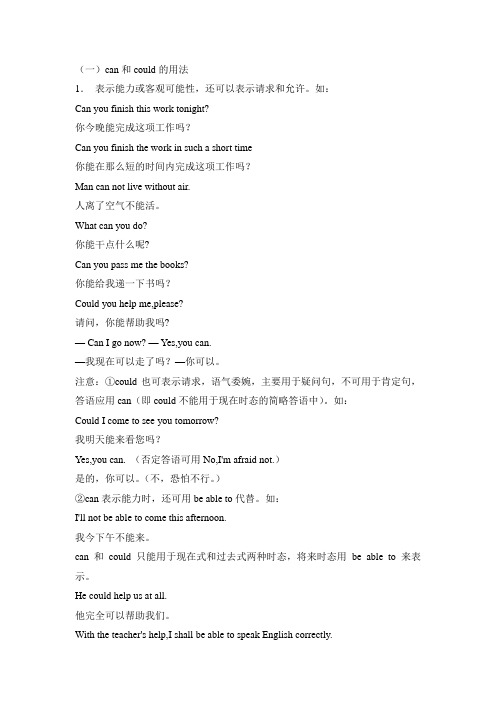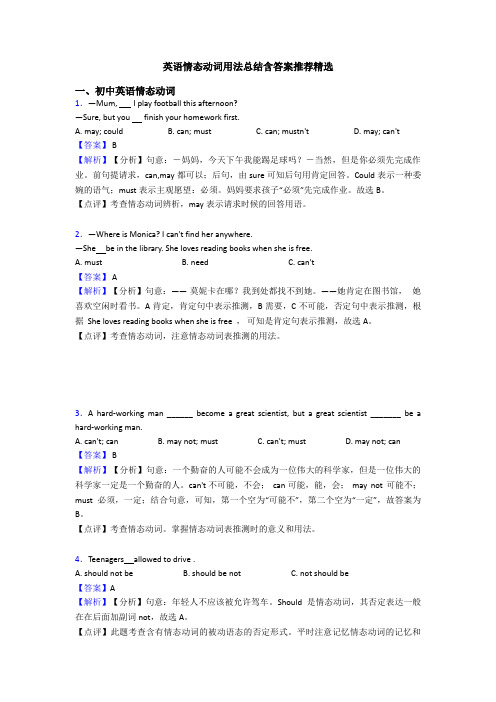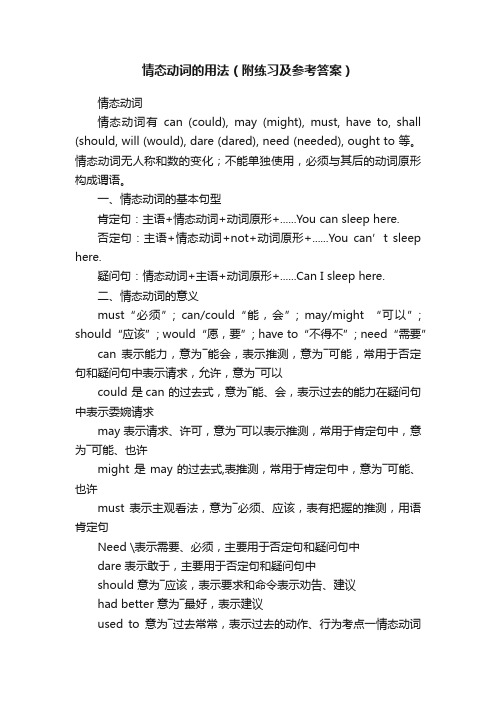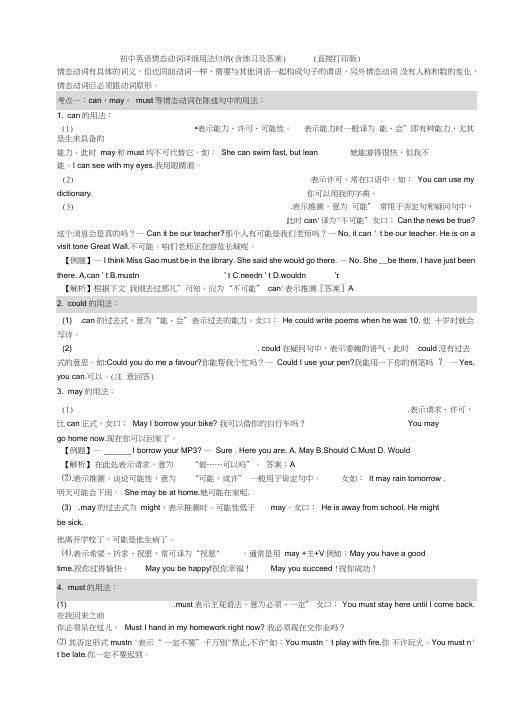(完整word版)小学初中英语情态动词详细用法归纳(含练习及答案),推荐文档
- 格式:doc
- 大小:68.01 KB
- 文档页数:7

(一)can和could的用法1.表示能力或客观可能性,还可以表示请求和允许。
如:Can you finish this work tonight?你今晚能完成这项工作吗?Can you finish the work in such a short time你能在那么短的时间内完成这项工作吗?Man can not live without air.人离了空气不能活。
What can you do?你能干点什么呢?Can you pass me the books?你能给我递一下书吗?Could you help me,please?请问,你能帮助我吗?— Can I go now? — Yes,you can.—我现在可以走了吗?—你可以。
注意:①could也可表示请求,语气委婉,主要用于疑问句,不可用于肯定句,答语应用can(即could不能用于现在时态的简略答语中)。
如:Could I come to see you tomorrow?我明天能来看您吗?Yes,you can. (否定答语可用No,I'm afraid not.)是的,你可以。
(不,恐怕不行。
)②can表示能力时,还可用be able to代替。
如:I'll not be able to come this afternoon.我今下午不能来。
can 和could 只能用于现在式和过去式两种时态,将来时态用be able to 来表示。
He could help us at all.他完全可以帮助我们。
With the teacher's help,I shall be able to speak English correctly.由于老师的帮助,我将能准确地讲英语。
2. “can”表达推测例:Can the news be true? 这消息会是真的吗?The news can't be true. 这消息不会是真的吧。

完整版英语情态动词用法详解含答案一、选择题1.— Mom, must I clean my room now?— No, you ________. You can do it after dinner.A.needn’t B.mustn’t C.shouldn’t D.can’t2.To my joy, we_________ go to the bank. Mary has lent us some money.A.shouldn’t B.needn’t C.couldn’t D.would n’t3.It’s of great importance to protect the environment. Each of us ________ take an active part in it.A.can B.may C.would D.should4.—Do we have to finish this today?—Yes, you ________ . Today is the last day.A.would B.may C.can D.must 5.—Hurry up, J ack! Let’s cross the road as fast as possible.—No, you ________. Don’t you see the light is still red?A.couldn’t B.wouldn’t C.mustn’t D.needn’t6.—Be careful! Fire ________ be dangerous sometimes.—OK. I will put it out right away.A.mustn’t B.should C.can D.needn’t 7.—Will my car be ready by the end of the day?—It ________ be, sir. I’ll call if there’s any problem.A.must B.could C.shall D.should 8.—Dad, must we wait until the light becomes green?—Yes, I am afraid we ________. That’s the traffic rule.A.may B.can C.have to D.need9.—________ you give me a hand? I can’t put up the poster by myself.—No problem.A.Could B.Should C.Need D.Must10.— Is Lang Lang going to perform at Art Center this Friday?— Yes. It ________ be him. He has been here for three days.A.might B.must C.mustn’t D.may11.You'd better __________ hard from now on, __________ you will fail the exam. A.work; and B.working; or C.working; and D.work; or 12.We teenagers ________ have dreams. With dreams and hard work, anything amazing________ be created.A.may; can B.might; should C.should; can D.must; has to 13.I ________ hear you clearly. Would you please repeat it?A.mustn’t B.can’t C.needn’t D.shouldn’t 14.You ________ drive after drinking alcohol(酒). It’s against the law.A.mustn’t B.needn’t C.couldn’t D.wouldn’t15.It’s amazing that the pen ________turn voice into text with few mistakes.A.can B.must C.may D.need16.If you buy your mum an iRobot floor cleaner, she ________ sweep the floor every day. A.can’t B.mustn’t C.needn’t D.s houldn’t 17.The boy is very brave.I ________ he ________ the tall tree.A.dare say; dares to climbB.dare to say; dare climbingC.dare saying; dares climbD.dare to say; dares climbed18.—The high school entrance examination is coming!—Yes, our teacher tells us we _______ be too careful while taking exams.A.mustn't B.shouldn't C.needn't D.can't19.---Will you be back early this evening?---Yes, but I ________ be a little late. Our boss sometimes has extra work for us.A.may B.must C.need D.will20.We’ve d iscussed every detail of this plan and have got everything ready. But still something __________ go wrong. We still have to be very careful.A.must B.should C.would D.may21.You ______ pay too much attention to your pronunciation, as it is so important in the oral (口头的) test.A.shouldn’t B.mustn’t C.can’t D.needn’t 22.—Will your mother be at home this Saturday?—Hard to say. She _______go to the countryside to see my grandparents.A.must B.may C.can D.would 23.Think twice before making a decision, or you __________ get into trouble.A.may B.can't C.shouldn't D.mustn't 24.Don’t cross the road until the traffic lights turn green. A car_______hit you.A.need B.may C.should D.must 25.—Where is Tom? I am considering ________ him about the result of the exam.—Oh. You ________. He has known it already.A.to tell; can't B.telling; needn't C.tell; mustn't D.told; shouldn't 26.—Will Jim come to Yangzhou for a holiday?—He ________come and it depends on how much homework he will have.A.may B.should C.must D.need27.Hurry up, or we ________ miss the beginning of the film.A.should B.must C.may D.have to 28.—How do you like my new dress?—Well, if I ________ say, it is not suitable for you.A.may B.must C.have to D.should29.—Must the children leave at six tomorrow morning?—No, they _______. They can have more time to get ready for the trip.A.can’t B.needn’t C.mustn’t D.may not 30.—Why didn’t you tell it to me earlier?— Why ________ I? I want to have my own secret.A.can B.may C.should D.shall31.A hard-working man ________ become a great scientist, but a great scientist ________ be a hard-working man.A.can’t; can B.may not; must C.can’t; must D.may not; can 32.—What is that young lady’s job?—She ________ be a nurse, I’m not sure.A.must B.may C.need D.would 33.According to the rule, used batteries ________ be dropped in the red bin for harmful wastes. A.may B.would C.should D.might34.You _________ smoke here! Look at the sign. It says "No smoking".A.needn't B.mustn't C.can D.may35.—Suzy described every detail of the accident just now.—Her memory ________ be completely back.A.shall B.need C.must D.could36.—Is that Mr Zhou?—It ________ be him. He has gone to Beijing.A.can B.may C.can’t D.shouldn’t 37.—Who’s singing next door? Is it Miss Wang?—It ________ be h er. She’s having the board meeting.A.can’t B.shouldn’t C.mustn’t D.needn’t38.— Mum, why do I have to wash hands so many times a day?—You ________ be too careful, for your health.A.can’t B.mustn’t C.may not D.needn’t39.To avoid ________, we’d better ________ the parents’ meeting online.A.gather; hold B.gathering; hold C.gather; holding D.to gather; to hold 40.I think all the students love the weekends because, to them, they ________ get up early on Saturdays or Sundays.A.mustn’t B.don’t need C.needn’t D.can’t41.—Is it usually warm in Yancheng in May?—Yes. But it _______ be rather cold sometimes.A.must B.should C.would D.can42.—Shall I tell him the change of the time right now?—I’m afraid you ________, otherwise he will be late for the meeting.A.can B.may C.must D.need43.—Will dad arrive home at 6 o’clock to have dinner with us this evening?— I think he will, but he ________ not. Sometimes he works extra hours.A.can B.must C.need D.may 44.—Excuse me. I haven’t finished reading the book yet. M ay I keep it a bit longer?— Sorry, you ________. You must return it on time.A.needn’t B.can’t C.won’t D.shouldn’t 45.Cars ________ give way to walkers on some roads in Binhai, or the drivers will be fined. A.may B.will C.can D.must 46.Sometimes smiles ________ be false, hiding other feelings like anger, fear or worry. A.should B.would C.must D.can 47.—Could you tell me how to renew the library books?—With pleasure. You ________ come to our desk every time. It’s easier to renew them online. A.can’t B.must n’t C.needn’t D.shouldn’t 48.—The article says that a person’s animal sign decides his personality.—You ________ read it for fun, but don’t believe in that.A.can B.must C.shouldn’t D.needn’t49.— What do you think of the show yesterday?— Some of them were really good but others ________ be better.A.will B.must C.need D.can50.Never throw objects from the building. Even a small object ________ cause serious injuries, or death, when dropped from a great height.A.must B.should C.may D.need【参考答案】***试卷处理标记,请不要删除一、选择题1.A解析:A【详解】句意:——妈妈,我现在必须打扫房间吗?——不,不需要。

初中英语情态动词详细用法归纳(含练习及答案)情态动词有具体的词义,但也同助动词一样,需要与其他词语一起构成句子的谓语,另外情态动词没有人称和数的变化,情态动词后必须跟动词原形。
1. can 的用法:(1).表示能力、许可、可能性。
表示能力时一般译为“能、会”,即有种能力,尤其是生来具备的能力.如:She can swim fast, but I can’t . 她能游得很快,但我不能。
I can see with my eyes. 我用眼睛看。
could是can的过去式。
表示过去的能力。
be able to do sth. 常常指经过努力,花费了时间和劳力之后才能做到某事。
is/am/are able to do sthwas/were able to do sth.(2).表示许可,常在口语中。
如:You can use my dictionary. 你可以用我的字典。
(3).表示推测,可能性,意为“可能”,常用于否定句和疑问句中,此时can’t 译为“ 不可能”。
如:Can the news be true 这个消息会是真的吗—Can it be our teacher那个人有可能是我们老师吗—No, it can’t be our teacher. He is on a visit to the Great Wall.不可能。
咱们老师正在游览长城呢。
【例题】—I think Miss Gao must be in the library. She said she would go there. —No. She __be there, I have just been there. ’t ’t ’t ’t【解析】根据下文“我刚去过那儿”可知,应为“ 不可能”,can’t 表示推测[答案] Acould的用法:(1).can的过去式,意为“ 能、会”,表示过去的能力。
如:He could write poems when he was 10. 他十岁时就会写诗。

英语情态动词用法总结含答案推荐精选一、初中英语情态动词1.—Mum, I play football this afternoon?—Sure, but you finish your homework first.A. may; couldB. can; mustC. can; mustn'tD. may; can't【答案】 B【解析】【分析】句意:-妈妈,今天下午我能踢足球吗?-当然,但是你必须先完成作业。
前句提请求,can,may都可以;后句,由sure可知后句用肯定回答。
Could表示一种委婉的语气;must表示主观愿望:必须。
妈妈要求孩子“必须”先完成作业。
故选B。
【点评】考查情态动词辨析,may表示请求时候的回答用语。
2.—Where is Monica? I can't find her anywhere.—She be in the library. She loves reading books when she is free.A. mustB. needC. can't【答案】 A【解析】【分析】句意:——莫妮卡在哪?我到处都找不到她。
——她肯定在图书馆,她喜欢空闲时看书。
A肯定,肯定句中表示推测,B需要,C不可能,否定句中表示推测,根据 She loves reading books when she is free ,可知是肯定句表示推测,故选A。
【点评】考查情态动词,注意情态动词表推测的用法。
3.A hard-working man ______ become a great scientist, but a great scientist _______ be a hard-working man.A. can't; canB. may not; mustC. can't; mustD. may not; can【答案】 B【解析】【分析】句意:一个勤奋的人可能不会成为一位伟大的科学家,但是一位伟大的科学家一定是一个勤奋的人。

情态动词的用法(附练习及参考答案)情态动词情态动词有can (could), may (might), must, have to, shall (should, will (would), dare (dared), need (needed), ought to 等。
情态动词无人称和数的变化;不能单独使用,必须与其后的动词原形构成谓语。
一、情态动词的基本句型肯定句:主语+情态动词+动词原形+......You can sleep here.否定句:主语+情态动词+not+动词原形+......You can’t sleep here.疑问句:情态动词+主语+动词原形+......Can I sleep here.二、情态动词的意义must“必须”; can/could“能,会”; may/might “可以”; should“应该”; would“愿,要”; have to“不得不”; need“需要”can 表示能力,意为―能会,表示推测,意为―可能,常用于否定句和疑问句中表示请求,允许,意为―可以could 是can 的过去式,意为―能、会,表示过去的能力在疑问句中表示委婉请求may 表示请求、许可,意为―可以表示推测,常用于肯定句中,意为―可能、也许might 是may的过去式,表推测,常用于肯定句中,意为―可能、也许must 表示主观看法,意为―必须、应该,表有把握的推测,用语肯定句Need \表示需要、必须,主要用于否定句和疑问句中dare 表示敢于,主要用于否定句和疑问句中should 意为―应该,表示要求和命令表示劝告、建议had better 意为―最好,表示建议used to意为―过去常常,表示过去的动作、行为考点一情态动词情态动词有具体的词义,但也同助动词一样,需要与其他词语一起构成句子的谓语,另外情态动词没哟人称和数的变化,情态动词后必须跟动词原形。
三、情态动词的基本用法1. can 的用法(1)表示能力、许可、可能性。

初中英语情态动词详细用法归纳(含练习及答案) (直接打印版)情态动词有具体的词义,但也同助动词一样,需要与其他词语一起构成句子的谓语,另外情态动词没有人称和数的变化,情态动词后必须跟动词原形。
1. can的用法:(1)•表示能力、许可、可能性。
表示能力时一般译为能、会”即有种能力,尤其是生来具备的能力,此时may和must均不可代替它。
如:She can swim fast, but lean 她能游得很快,但我不能。
I can see with my eyes.我用眼睛看。
(2)表示许可,常在口语中。
如:You can use my dictionary. 你可以用我的字典。
(3).表示推测,意为可能” 常用于否定句和疑问句中,此时can'译为"不可能”女口:Can the news be true?这个消息会是真的吗?一Can it be our teacher?那个人有可能是我们老师吗?一No, it can ' t be our teacher. He is on a visit tone Great Wall.不可能。
咱们老师正在游览长城呢。
【例题】一I think Miss Gao must be in the library. She said she would go there. —No. She __be there, I have just beenthere. A.can ' t B.mustn ' t C.needn ' t D.wouldn 't【解析】根据下文我刚去过那儿”可知,应为“不可能” can'表示推测[答案]A(1) .can的过去式,意为“能、会”表示过去的能力。
女口:He could write poems when he was 10. 他十岁时就会写诗。
(2) . could在疑问句中,表示委婉的语气,此时could没有过去式的意思。
人教版英语英语情态动词完整归纳含答案解析百度文库一、初中英语情态动词1.— We've ordered too much food. I eat any more.—Never mind. Let' take it home.A. can'tB. mustn'tC. needn'tD. shouldn't【答案】 A【解析】【分析】句意:——我们已经点了太多的食物,我不能再吃了。
——没关系,我们带回家吧。
can't不能;mustn't必须不;一定不要;needn't不必;shouldn't不应该。
根据句意可知选A。
【点评】考查情态动词辨析。
2.—Where is Monica? I can't find her anywhere.—She be in the library. She loves reading books when she is free.A. mustB. needC. can't【答案】 A【解析】【分析】句意:——莫妮卡在哪?我到处都找不到她。
——她肯定在图书馆,她喜欢空闲时看书。
A肯定,肯定句中表示推测,B需要,C不可能,否定句中表示推测,根据 She loves reading books when she is free ,可知是肯定句表示推测,故选A。
【点评】考查情态动词,注意情态动词表推测的用法。
3.— __________I wear a tie to Janet's birthday party?— No,you needn't. But do remember to bring her a present.A. MustB. ShouldC. NeedD. Can【答案】 A【解析】【分析】句意:——我必须戴领带去参加Jane的生日聚会吗?——不,你不必,但是记住给她带个礼物。
初中英语情态动词详细用法归纳(含练习及答案)之吉白夕凡创作情态动词有具体的词义,但也同助动词一样,需要与其他词语一起组成句子的谓语,另外情态动词没有人称和数的变更,情态动词后必须跟动词原形.考点一:can,may,must 等情态动词在陈述句中的用法:1. can 的用法:(1).暗示能力、许可、可能性.暗示能力时一般译为“能、会”,即有种能力,尤其是生来具备的能力.如:She can swim fast, but I can’t . 她能游得很快,但我不克不及.I can see with my eyes.我用眼睛看.could是can的过去式.暗示过去的能力.be able to do sth.经常指经过努力,花费了时间和劳力之后才干做到某事.is/am/are able to do sthwas/were able to do sth.(2).暗示许可,常在口语中.如:You can use my dictionary. 你可以用我的字典.(3).暗示推测,可能性,意为“可能”,经常使用于否认句和疑问句中,此时can’t 译为“ 不成能”.如:Can the news be true? 这个消息会是真的吗?—Can it be our teacher?那团体有可能是我们老师吗?—No, it can’t be our teacher. He is on a visitto the Great Wall.不成能.咱们老师正在游览长城呢.【例题】—I think Miss Gao must be in the library. She said she would go there. —No. She __be there, I have just been there. A.can’t B.mustn’t C.needn’t D.wouldn’t【解析】按照下文“我刚去过那儿”可知,应为“ 不成能”, can’t 暗示推测[答案] Acould的用法:(1).can的过去式,意为“ 能、会”,暗示过去的能力.如:He could write poems when he was 10. 他十岁时就会写诗.(2). could在疑问句中,暗示委婉的语气,此时 could 没有过去式的意思.如:Could you give me a hand? 你能帮我个忙吗?—Could I use your pen? 我能用一下你的钢笔吗? —Yes, you can.可以.(用could问,不克不及用could答.)2. may的用法:(1).暗示请求、许可,比can 正式,如:May I borrow your bike? 我可以借你的自行车吗?You may go home now. 现在你可以回家了.【例题】—_______ I borrow your MP3? —Sure . Here you are.A. MayB.ShouldC.MustD. Would【解析】在此处暗示请求,意为“ 做……可以吗”.答案:A(2) .暗示推测,谈论可能性,意为“ 可能,或许”,一般用于肯定句中.如:It may rain tomorrow . 明天可能会下雨.She may be athome. 她可能在家呢.may not 翻译为“可能不”(3) .may的过去式为might ,暗示推测时.可能性低于may.如:He is away from school. He might be sick.他离开学校了,可能是他生病了.(4) . 暗示希望、祈求、祝愿,常可译为“祝愿”.通常是用may +主+V 例如:May you have a good time. 祝你过得愉快. May you be happy! 祝你幸福! May you succeed!祝你成功!3. must的用法:(1).must 暗示主不雅看法,意为“必须、一定”.如:You must stay here until I come back.在我回来之前你必须呆在这儿.Must I finish my homework right now? 我必须现在交作业吗?(must引导的疑问句)肯定回答:yes ,you must.否认回答:No, you needn’t/ don’t have to (2) 其否认形式mustn’t暗示“ 一定不要” “千万别” “禁止, 禁绝”. 如:You mustn’t play with fire. 你禁绝玩火.You mustn’t be late. 你一定不要迟到.(3)must暗示有掌控的推测,用于肯定句,指百分百肯定.如: The light is on, so he must be at home now.灯亮着,他现在肯定在家.(4)①must 和have to 都有”必须”的含义,但偏重点不合:must强调说话者主不雅(自己)的看法.have to强调客不雅(外力作用)的需要,也可以翻译为“不克不及不”.I must go to school and learn some Knowledge.我必须会学校上课学一些知识.(自己要回)I have to go to school because the holiday is over.假期结束了我不克不及不回学校上课了.②must 没有人称和数的变更,而have to 有动词单三形式:has to和动词过去式:had to将来时:will have tomust not=mustn’t 暗示禁止…….当must提问时,肯定回答用must.否认回答用needn’t 和don’t have to4. need的用法:(1).need做情态动词时:暗示“需要、必须”,主要用于否认句和疑问句中,其否认形式为needn’t,意为“没有需要,不必”.用need 提问时,肯定回答为 must,否认回答为needn’t或don’t have to.如:—Need I do my homework now?—Yes, you must .是的.—No. you needn’t /don’t have to. 不,你不必.(2).need 还可以作实义动词,此时有人称、数和时态的变更,如果主语是人sb.:sb. need(s) sth. 某人需要某物sb. need to do sth. 某人需要去做某事need的单三needs. 过去式needed. 变否认借助don’t/doesn’t /didn’t如:I need to pass the exam.我需要通过这次考试.He needs to learn English .他需要学习英语.如果主语是物sth.:Sth. need doing 某事需要被做= need to be done这种情况下应注意两点:①.主动形式的动名词doing具有主动的含义;②.该动名词可以改成其动词不定式的主动形式而句子的意义不变.例如:. Your car needs washing. = Your car needs to be washed.你的车需要洗了.5. shall 的用法:shall暗示征求对方意见(多用于第一、三人称),如:Shall we goout for a walk? 我们出去散步好吗?在英语中,我们可以用其他多种方法提出我们的建议或征求对方意见.Shall意为”要不要…..? ‘“……好吗?”’用于第一人称,表将来,而will可用于任何人称.(1).用“Let's do...”来提出建议.如:Let's go for a walk after supper.(2).用“What/How about...?”来提出建议;about后接名词或动词ing形式.如:What about/How about a drink? What about/How about taking Tom with us?(3).用“Why not...?”来提出建议,暗示“何不……”not面后接动词原形.“Why not...?”实际上是“Why don't you/we...?”的简略形式.如:Why not meet at the school gate at eight? Why don't we stay here another day?(4).用“Would you like...?”来提出建议,意思是“你想要……吗?”Would you like后可接名词或不定式.如:Would you like a cup of tea?Would you like to go and see her?因此,如果我们说:“去游泳好吗?”英语中可有这样几种表达法:Shall we go for a swim?Let's go for a swim,shall we?What about/How about going swimming?Why not go for a swim?Would you like to go for a swim?What do you think of going for a swim?6. should的用法:(1).should 意为“应该” ,可暗示劝告、建议、义务、责任等.如:We should protect ourselves.. 我们应该我们自己.should n ot=shouldn’t +do动词原形had better 的用法:had better 意为“最好”,没有人称的变更,后接+动词原形,其否认形式为:had better not.如:We had better go home now. 我们最好现在回家.You had better not go home now.你最好现在不要回家.should和had better 可以互换should not=shouldn’t和had better not可以互换7. will 的用法:Will①暗示意愿、意志、打算,可用于多种人称.如:I will help you if I’m free this afternoon.今天下午如果我有空,我就会帮你.②是一般将来时的“标记词”,will+ do动词原形注意:1、will在there be句型中的形式及其句式变换.由于“一般将来时”的结构可以用“will+动词原形”来暗示,所以there be句型的一般将来时的形式就是there will be.(一定不克不及说there will have)例如: There are many students in our school. →There will be many students in our school. There will be a sports meeting next week. 一定不克不及说:There will have a sports meeting next week.2、will 与be going to do sth区别:①. be going to 暗示打算,计划,安插要去做的事情或有预兆即将产生某事,will 暗示的将来时间则较远一些,如:He is going to Beijing on National Day.He will write a book some day.②. be going to 暗示按照主不雅判断将来肯定产生的事情,will 暗示客不雅上将来势必产生的事情.如:I am going to be a teacher.He will pass the exam because of hard work.③.在有条件从句的主句中,一般不必 be going to, 而多用will, 如:I will go to school if I feel better.考点二:含有情态动词的疑问句的回答:1.对 may 引出的问句,可以有下列回答方法:Yes,you may. Yes, of course.Yes, certainly.Sure .No, you mustn’t. No, you can’t.2.对must引出的疑问句,回答方法为:Yes, …must. No,… needn’t/ don’t have to.3.could在疑问句中,暗示委婉的语气,此时 could 没有过去式的意思.如:Could you do me a favour? 你能帮我个忙吗?—Could Iuse your pen?—Yes, you can.可以.(回答不必could)4. shall引出的疑问句用于第一人称,暗示征求对方意见或客气的请求.其回答方法有以下几种:Yes, please.All right.No, thank you.5.would you…的回答方法有以下几种:Yes, I will. (No, I won’t.)Sure . (I’m sorry , I can’t.)All right/ OK/ With pleasure.Certainly. (No, thank you .)Yes, please.【例题】—Would you give me a hand and pass my thanks to Lily?—________.A.That’s rightB.With pleasureC.It doesn’t matterD.No trouble【解析】A. 意为“对了” ,B.意为“ 乐意效劳”, C. 意为“ 没关系” D.意为“不费事”.答案:B6.will yo u ………?提问回答方法,可以使yes,…../no……也可以.I’d be glad to…..考点三:不合情态动词的否认意义也不合:1.(1).can’t可译为“不会”,如:I can’t play basketball. 我不会打篮球.(2)当句子表推测时,用can’t 表达”不成能”,如:He can’t be ill. He is playing chess with Tom. 他不成能病了,他正和Tom 下棋呢.(3)can’t 还可用来回答“ May I …? ” 这样的问句.如:MayI come in ? 我可以进来吗?No, you mustn’t. / can’t. 不,你不克不及.(4)can’t 还可用于固定习语中.can’t help doing 禁不住,…情不自禁… can’t wait to do sth 迫不及待…如:She can’t help crying. 她不由大哭起来.The children can’t wait to open the box. 孩子们迫不及待地想打开盒子.2. may的否认式为 may not,译成“ 可能不”,如:He may not be at home. 他也许不在家.3.(1)mustn’t 暗示禁绝,不成.如:He mustn’t leave his room. 他禁绝离开他的房间.You mustn’t talk in class. 你们不成以在课上说话.(2) mustn’t 也可用于以 may 暗示要求时的否认回答中.如:—May I stand here? 我可以站在这里吗?—No, you mustn’t (can’t). 不,不成.4.needn’t 意为“ 不必”.如:You needn’t mee t him unless you’d like to.你不需要见他,除非你愿意.5. shouldn’t 暗示不该该.如:You shouldn’t feel so unhappy over such little things. 对于这种小事,你不该该感应这么不欢快.考点四: 情态动词暗示推测的用法:一、“情态动词+动词原形”暗示对现在的推测.1、must暗示肯定的推测100%的肯定,一般用于肯定句中.如:He must be at home because the light is stillon.2、Should暗示推测的可能性比较大,<must的可能性小一点.如:It is already 10 o’clock now they should be there.3、can暗示推测时一般用于否认句或疑问句.如:Who is knocking at the door?Can it be the postman?could暗示推测时,语气can比要弱,说话者留有余地—Could it be an animal?—It could not be, because it is not moving.4、may暗示推测,用于肯定句.might也可以表推测只是暗示其可能性较小于may.如:The man may be your new teacher..—Where is Mr Li? —He might be working in his office.【情态动词易混点归纳】易混点一: can和be able to:两者暗示能力时用法相同,但can只有原形“can”和过去式“could”两种形式,在其他时态中要用be able to 来暗示.另外be able to 经常指经过努力,花费了时间和劳力之后才干做到某事.如:Jim can’t speak English.吉姆不会说英语.He could speak English at 5. 他五岁时就会说英语.We’ll be able to see him next week.下星期我们将会见到他.He has been able to drive. 他已经会开车了.I’m sure you’ll be able to finish it quickly.我相信你能迅速地完成.We were able to reach the top of the mountain at noon.我们能在中午到达山顶.易混点二:can和may1. can 和 may 均可用来征求意见或许可,意为“可以”,一般可互换使用.如:Can/ May I help you ? 我能帮忙你吗?2. can 和may 暗示推测/可能性时的区别:Can 不肯,May 不问.妈妈(must)肯定不否问.1)在肯定句中用 might,may,must,不必can如:She may be in the classroom . 她可能在2) 在否认句中用can’t(不成能),不必 may, must.3)在疑问句中暗示推测用can,不必 might,may,must教室里.Where can they be now? 他们现在可能在哪儿?That can’t be true. 那不成能是真的.易混点三: may be 和maybe用法区别经常使用位置may be may为情态动词, be为动词原形句中,作谓语maybe 副词,大概、也许,相当于perhaps 句首,作状语例如:He may be wrong , but I’m not sure. 也许他错了,但我也不确定.易混点四:can’t 和mustn’t1. can’t 按照其基本用法可译为:(1)不会.如:I can’t speak English . 我不会说英语.(2)不克不及.如:We can’t do it now because it’s too dark.天太黑了,我们现在干不了.(3)否认句中暗示推测.“不成能”,如:The man can’t be our teacher because he is much younger than our teacher.. 那团体不成能是咱们老师,他年轻得多.2. mustn’t 意为“ 禁止、禁绝”,用来表达命令,暗示强烈的语气.如:You mustn’t play football in the street. It’s too dangerous.你不成以在街上踢足球,太危险了.易混点五:must 和 have to1.must 偏重于团体意志和主不雅上的需要.have to 偏重于客不雅上的需要,可用于现在时、过去时和将来时.如:I know I must study hard.我知道我必须努力学习.My brother was very ill, so I had to call the doctor in the mid-night.我弟弟病得厉害,我只得三更里把医生请来.I haven’t got any money with me, so I’ll have to borrow some from my friend.我身上没带钱,只好向朋友借点了.He said they must work hard.他说他们必须努力任务.2. have to可以用于多种时态;而must只用于一般现在或将来.如:The composition is due to hand in this morning, so I had to finish it last night. 作文今天早晨到期,因此我不克不及不昨天晚上完成.【情态动词例题解析】1、—________ you pass me a pen? I’d like to write down the phone number. —Sure. Here it is.A. CanB. NeedC. MightD. Must【解析】由题干可知,本句暗示请求、许可.答案:A2、—May I go to the cinema, mum? — Certainly, but you ________ be back by 11 o’clock.A. canB. mayC. mustD. need【解析】由题意可知,此处并不是表推测的用法,而是妈妈对孩子提出的要求,故选C, 意为“ 必须”.答案:C3、You ______ get there by bus. A. don’t need B. needn’t to C. don’t need to D. need don’t to【解析】由选项 A 可知 need 为实义动词,故应加上to 才正确.选项 B needn’t为情态动词,应去掉to,故选 C.4、You _______ worry about me. It’s nothing serious. A. can’t B. mustn’t C. needn’t D. won’t【解析】由题干It’s nothing serious 可推断,第一句意为“你不必为我担心”,故选C.本题易错选B, mustn’t 意为“禁止”,故不正确.答案:C5、—Excuse me. Is this the right way to the SummerPalace? —Sorry, I’m not sure . But it _______ be.A. mightB.mustn’tC.can’tD.must解析】考查情态动词might 表推测的用法. “I’m not sure” 说明说话者的语气其实不肯定,所以要用 might.答案:A6、The man in the office___be Mr. Black, because he went home just now.A.mustn’tB.may notC.can’tD.needn’t【解析】由下文 he went home just now 可知,作者判断办公室里那团体(不成能是Mr. Black.mustn’t 意为“千万别”,may not 意为“可能不”, needn’t意为“不必”. can’t 意为不成能,故选C.7、—Can you go surfing with us this afternoon?—I’d like to , but I __ look after my sister at home , because my mother is ill.A.needB.mustC.have toD.should【解析】由题干my mother is ill 为客不雅要求可知,选C. 8、—May I take this book out of the reading room? —______. Please read it here.A. CertainlyB.No, you needn’tC.No, you mustn’tD.No,you may not【解析】May I…?的否认答语为No, you can’t/ mustn’t.;Must I …?否认答语为No,you needn’t/don’t have to.;Can I …?的否认答语为No,you can’t. 在口语交际中,要体会句子中的情感不同.答案:C【情态动词活学巧练】1. John___ come to see us tonight, but he isn't very sure yet.A. mayB. canC. has toD. must2. They ___ do well in the exam.A. can be able toB. be able toC. can able toD. are able to3.—May I take this book out? —No, you___.A. can'tB. may notC. needn'tD. aren't4 .You___ go and see a doctor at once because you're got a fever.A. canB. mustC. dareD. would5.—Can you speak Japanese? —No, I____.A. mustn'tB. can'tC. needn'tD. may not6.—He___ be in the classroom, I think.—No, he ___ be in the classroom. I saw him go home a minute ago.A. can; may notB. must; may notC. may; can'tD. may;mustn't7.—Shall I get one more cake for you, Dad? —Thanks, but you___, I've had enough.A. may notB. must notC. can'tD. needn't8. Even the top students in our class can't work out this problem, so it __________ be very difficult.A. mayB. mustC. canD. need9. He isn't at school. I think he ___ be ill.A. canB. shallC. mustD. has to10. ___ I take this one?A. MayB. WillC. AreD. Do11. The children___ play football on the road.A. can'tB. canC. mustn'tD. must12. You ___ be late for school again next time.A. mustn'tB. needn'tC. don't have toD. don't need to13.—Must I do my homework at once? —No, you___.A. needn'tB. mustn'tC. can'tD. may not14. His arm is all right. He___ go and see the doctor.A. has not toB. don't have toC. haven't toD. doesn't have to15You'd better___late next time.A. not to beB. not beC. won't beD. don't be16. You'd better ___ your hair ___ once a month.A. had; cutB. had; cuttedC. have; cutD. have; cutted17. You___ ask that man over there. Maybe he knows the way.A. had better not toB. had not betterC. had betterD. had better not18.—Shall we go and visit the History Museum next Sunday? —________A. Here you areB. Sorry, I can'tC. Yes, pleaseD. Let me try19—Why don't you ask Mike to go with us? —Thanks, ___.A. I willB. I won'tC. leanD. I may20.—___ I take the newspaper away? —No, you mustn't. You____read it only here.A. Must; canB. May; canC. Need; mustD. Must; must21 Excuse me. ___ you please pass me that cup?A. DoB. ShouldC. WouldD. Must22. ___ you like to have another try?A. CouldB. WillC. WouldD. Do23 —Would you like to go boating with us? —Yes, ___.A. I'd likeB. I wantC. I'd like toD. I do24.You___ worry about your son. He will get well soon.A. needn'tB. can'tC. mustn'tD. have to25.The poor man needs our help, ___ he?A. needB. needn'tC. doesD. doesn't26.—Must we do our homework first? —No, you___. You may havea rest first.A. mustn'tB. needn'tC. may notD. can't【参考答案】1---5. A D A B B 2---10. C D B C A 11----15. C A A D B 16---20.C C B A B21-25.C C C A D 26.B。
情态动词有具体的词义,但也同助动词一样,需要与其他词语一起构成句子的谓语,另外情态动词没有人称和数的变化,情态动词后必须跟动词原形。
1.can的用法:(1).表示能力、许可、可能性。
表示能力时一般译为“能、会”,即有种能力,尤其是生来具备的能力.如:She can swim fast, but I can't.她能游得很快,但我不能。
I can see with my eyes.我用眼睛看。
could是can的过去式。
表示过去的能力。
be able to do sth.常常指经过努力,花费了时间和劳力之后才能做到某事。
is/am/are able to do sthwas/were able to do sth.(2).表示许可,常在口语中。
如:You can use my dictionary. 你可以用我的字典。
(3).表示推测,可能性,意为“可能",常用于否定句和疑问句中,此时can't译为“不可能"。
如:Can the news be true?这个消息会是真的吗?一Can it be our teacher?那个人有可能是我们老师吗? —No, it can't be our teacher. He is on a visit to the Great Wall.不可能。
咱们老师正在游览长城呢。
【例题】一I think Miss Gao must be in the library. She said she would go there. —No. She —be there, I have just been there. A.can't B.mustn't C.needn't D.wouldn't【解析】根据下文“我刚去过那儿”可知,应为“不可能”,can、表示推测[答案]Acould的用法:(1).can的过去式,意为"能、会“,表示过去的能力。
初中英语情态动词详细用法归纳情态动词有具体的词义,情态动词没有人称和数的变化,情态动词后必须跟动词原形。
1. can 的用法:(1).表能力, 也就是可以做某件事的能力。
译为“能、会、可以”,.如:I can play basketball. 我可以打篮球。
I can run very fast. 我可以跑得很快。
(2).表示许可,语气委婉。
如:You can use my dictionary. 你可以用我的字典。
Can I have some bread?我能吃一些面包吗?(3).表示推测,可能性,意为“可能”,常用于否定句和疑问句中,如:Can the news be true? 这个消息会是真的吗?—Can it be our teacher?那个人有可能是我们老师吗?—No, it can’t be our teacher. He is on a visit to the Great Wall.不可能。
咱们老师正在游览长城呢。
【例题】—I think Miss Gao must be in the library. She said she would go there.—No. She _____be there, I have just been there.A.can’tB.mustn’tC.needn’tD.wouldn’tcould的用法:(1).can的过去式,用于肯定句,意为“ 能、会”,表示过去的能力。
如:He could sing well when he was a child.他是个小孩子时唱歌很好听。
(2). could在疑问句中,表示委婉的语气,此时could 没有过去式的意思。
如:①Could you help me? 你能帮我个忙吗?②—Could I use your bike? 我能用一下你的自行车吗?注意回答:用could问,不能用could答,只能用can 回答。
小学初中英语情态动词详细用法归纳(含练习及答案)情态动词有具体的词义,但也同助动词一样,需要与其他词语一起构成句子的谓语,另外情态动词没有人称和数的变化,情态动词后必须跟动词原形。
1. can 的用法:(1).表示能力、许可、可能性。
表示能力时一般译为“能、会”,即有种能力,尤其是生来具备的能力.如:She can swim fast, but I can’t . 她能游得很快,但我不能。
I can see with my eyes. 我用眼睛看。
could是can的过去式。
表示过去的能力。
be able to do sth. 常常指经过努力,花费了时间和劳力之后才能做到某事。
is/am/are able to do sthwas/were able to do sth.(2).表示许可,常在口语中。
如:You can use my dictionary. 你可以用我的字典。
(3).表示推测,可能性,意为“可能”,常用于否定句和疑问句中,此时can’t 译为“ 不可能”。
如:Can the news be true? 这个消息会是真的吗?—Can it be our teacher?那个人有可能是我们老师吗?—No, it can’t be our teacher. He is on a visit to the Great Wall.不可能。
咱们老师正在游览长城呢。
【例题】—I think Miss Gao must be in the library. She said she would go there. —No. She __be there, I have just been there. A.can’t B.mustn’t C.needn’t D.wouldn’t【解析】根据下文“我刚去过那儿”可知,应为“ 不可能”,can’t 表示推测[答案] Acould的用法:(1).can的过去式,意为“ 能、会”,表示过去的能力。
如:He could write poems when he was 10. 他十岁时就会写诗。
(2). could在疑问句中,表示委婉的语气,此时could 没有过去式的意思。
如:Could you give me a hand? 你能帮我个忙吗?—Could I use your pen? 我能用一下你的钢笔吗? —Yes, you can.可以。
(用could问,不能用could答。
)2. may的用法:(1).表示请求、许可,比can 正式,如:May I borrow your bike? 我可以借你的自行车吗?You may go home now. 现在你可以回家了。
【例题】—_______ I borrow your MP3? —Sure . Here you are. A. May B.Should C.Must D. Would 【解析】在此处表示请求,意为“ 做……可以吗”。
答案:A(2) .表示推测,谈论可能性,意为“ 可能,或许”,一般用于肯定句中。
如:It may rain tomorrow . 明天可能会下雨。
She may be at home. 她可能在家呢. may not 翻译为“可能不”(3) .may的过去式为might ,表示推测时。
可能性低于may。
如:He is away from school. He might be sick.他离开学校了,可能是他生病了。
(4) . 表示希望、祈求、祝愿,常可译为“祝愿”。
通常是用may +主+V 例如:May you have a good time. 祝你过得愉快。
May you be happy! 祝你幸福!May you succeed!祝你成功!3. must的用法:(1).must 表示主观看法,意为“必须、一定”。
如:You must stay here until I come back.在我回来之前你必须呆在这儿。
Must I finish my homework right now? 我必须现在交作业吗?(must引导的疑问句) 肯定回答:yes ,you must.否定回答:No, you needn’t/ don’t have to(2) 其否定形式mustn’t表示“ 一定不要” “千万别” “禁止, 不许”. 如:You mustn’t play with fire. 你不许玩火。
You mustn’t be late. 你一定不要迟到。
(3)must表示有把握的推测,用于肯定句,指百分百肯定。
如: The light is on, so he must be at home now.灯亮着,他现在肯定在家。
(4)①must 和have to 都有”必须”的含义,但侧重点不同:must强调说话者主观(自己)的看法。
have to强调客观(外力作用)的需要,也可以翻译为“不得不”。
I must go to school and learn some Knowledge.我必须会学校上课学一些知识。
(自己要回)I have to go to school because the holiday is over.假期结束了我不得不回学校上课了。
②must 没有人称和数的变化,而have to 有动词单三形式:has to和动词过去式:had to将来时:will have tomust not=mustn’t 表示禁止…….当must提问时,肯定回答用must。
否定回答用needn’t 和don’t have to4. need的用法:(1).need做情态动词时:表示“需要、必须”,主要用于否定句和疑问句中,其否定形式为needn’t,意为“没有必要,不必”。
用need 提问时,肯定回答为must,否定回答为needn’t或don’t have to。
如:—Need I do my homework now?—Yes, you must .是的。
—No. you needn’t /don’t have to. 不,你不必。
(2).need 还可以作实义动词,此时有人称、数和时态的变化,如果主语是人sb.:sb. need(s) sth. 某人需要某物sb. need to do sth. 某人需要去做某事need的单三needs. 过去式needed。
变否定借助don’t/doesn’t /didn’t如:I need to pass the exam. 我需要通过这次考试。
He needs to learn English .他需要学习英语。
如果主语是物sth.:Sth. need doing 某事需要被做= need to be done这种情况下应注意两点:①.主动形式的动名词doing具有被动的含义;②.该动名词可以改为其动词不定式的被动形式而句子的意义不变。
例如:. Your car needs washing. = Your car needs to be washed. 你的车需要洗了。
5. shall 的用法:shall表示征求对方意见(多用于第一、三人称),如:Shall we go out for a walk? 我们出去散步好吗?在英语中,我们可以用其他多种方式提出我们的建议或征求对方意见。
Shall意为”要不要…..? ‘“……好吗?”’用于第一人称,表将来,而will可用于任何人称。
(1).用“Let's do...”来提出建议。
如:Let's go for a walk after supper.(2).用“What/How about...?”来提出建议;about后接名词或动词ing形式。
如:What about/How abouta drink? What about/How about taking Tom with us?(3).用“Why not...?”来提出建议,表示“何不……”not面后接动词原形。
“Why not...?”实际上是“Why don't you/we...?”的简略形式。
如:Why not meet at the school gate at eight? Why don't we stay here another day?(4).用“Would you like...?”来提出建议,意思是“你想要……吗?”Would you like后可接名词或不定式。
如:Would you like a cup of tea?Would you like to go and see her?因此,如果我们说:“去游泳好吗?”英语中可有这样几种表达法:Shall we go for a swim?Let's go for a swim,shall we?What about/How about going swimming?Why not go for a swim?Would you like to go for a swim?What do you think of going for a swim?6. should的用法:(1).should 意为“应该” ,可表示劝告、建议、义务、责任等。
如:We should protect ourselves.. 我们应该我们自己。
should not=shouldn’t +do动词原形had better 的用法:had better 意为“最好”,没有人称的变化,后接+动词原形,其否定形式为:hadbetter not。
如:We had better go home now. 我们最好现在回家。
You had better not go home now.你最好现在不要回家。
should和had better 可以互换should not=shouldn’t和had better not可以互换7. will 的用法:Wil l①表示意愿、意志、打算,可用于多种人称。
如:I will help you if I’m free this afternoon.今天下午如果我有空,我就会帮你。
②是一般将来时的“标志词”,will+ do动词原形注意:1、will在there be句型中的形式及其句式变换。
由于“一般将来时”的结构可以用“will+动词原形”来表示,所以there be句型的一般将来时的形(一定不能说there will have)例如:There are many students in our school. →There 式就是there will be。